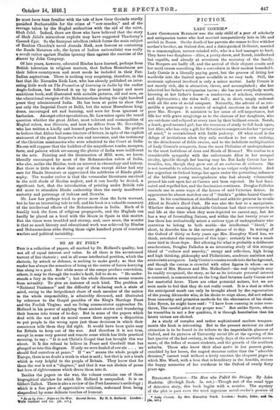FICTION.
LADY CONNTIE.*
LADY CONSTANCH BLEpLow was the only child of a peer of scholarly and antiquarian tastes who had married comparatively late in life and settled in Rome. On the death of her parents she comes to live with her mother's brother, an Oxford don, and a distinguished Hellenist, married to a commonplace, narrow-minded wife, who is a had manager to boot. They have two daughters—Alice, a pretty shrew, and Norsk intellectual but capable, and already at seventeen the mainstay of the family. The Hoopers are badly off, and the arrival of their elegant cousin and her maid causes something like a convulsion in their modest household. Lady Connie is a liberally paying guest, but the process of fitting her wardrobe into the limited spew available is no easy task. Still, the economic upheaval involved is only a minor matter. Lady Connie in not merely rich, she is attractive, clever, and accomplished ; she has inherited her father's antiquarian tastes ; she has mot everybody worth knowing at her father's house—a rendezvous of scholars, statesmen, and diplomatists ; she rides well ; and is, in short, amply endowed with all the arts of social conquest. Naturally, the advent of so irre- sistible a pereonage is a source of mingled emotions in the mind of poor Mo. Hooper. It ministers to her sense of self-importance, but fills her with grave misgivings as to the chances of her daughters, who are outshone and eclipsed at every turn by their brilliant cousin. North, a frank, good-natured girl, has the resources of study to fall back upon, but Alice, who has only a gift for flirtation to compensate for her "penury of mind," is overwhelmed with futile jealoesy. Of what avail is the deluge of invitations when they only conduce to her own undoing, to the detachment of fickle swains, and to the indefinite multiplication of Lady Connie's conquests, from the most Philistine of undergraduates to the most fastidious of dons and Heads of Houses ? We confess to a considerable sympathy with the unfortunate Alice in her unequal rivalry, ignoble though het bearing may be. But Lady Connie has her troubles, too, though they grow out of an embarras de richesses. She is not insensible to admiration, but sho is no vulgar scalp-hunter. And her migration to Oxford brings her again under the perturbing influence of the brilliant young undergraduate who had already vehemently pressed his suit upon her at Cannes and been rejected. lle had fasci- nated and repelled her, and the fascination continues. Douglas Falloden reminds one in some ways of the heroes of mid-Victorian fiction. In appearance he elmost matches one of " Ouida's " golden-haired Guards- men. In his combination of intellectual and athletic prowess he recalls Alfred in Rondo's Hard Cash. Ho WM also the heir to a merquisate. Whether these amazing Admirable Crichtons had their counterparts in real life at the time when they were depicted we cannot say, but Art has a way of forestalling Nature, and within the last twenty years or less there has undoubtedly arisen a curious type of undergraduate who contrives to belong to both worlds—the intellectual "blood," in short, to describe him in the current plirnee of to-day. In writing of the Oxford of thirty or forty years ago Mrs. Humilhry Ward has, we think, antedated the emergence of this typo : certainly ho was a much rarer bird in those days. But allowing for what is probably a deliberate anachronism, Douglas FaLloden is an interesting study of tins strange blend of "culture and anarchy," energy and redaction, high living and high thinking, philosophy and Philistinism, academic ambition and aristocratic arrogance. Lady Connie's eouains recede into the beekground, and though the canvas is crowded with other figures in wheel—as in the case of Mrs. Manson and Mrs. Mulholland—the real originals may be readily recognized, the story, so far as its intimate personal interest is concerned, is concentrated on the long duel between Lady Connie and her masterful lover. There are other potential suitors, but we are soon made to feel that they do not really count. It is a duol in which the anticipated result can only be brought about by the regeneration of the young Alexander who, in his &aim to reign alone, did not refrain from unworthy and primitive methods for the elimination of his rivals. Like Byron, he might have said : "I have been cunning in mine over- throw, The careful pilot of my proper woe." But unlike Byron, whom he resembles in not a few qualities, it is through humiliation that his latent virtues are elicited.
As a study of complex and rather sophisticated modern tempera- ments the book is interesting. But to the present reviewer its chief attraction is to be found in its tribute to the imperishable glamour of Oxford, and its pictures pf idoiversity social life et the opening of the last quarter of the last century, in the early days of the aesthetic move- ment, of the influx of women students, and the growth of the northern suburbs. Those who know their alma metier in her present guise, ennobled by her losses, the august mourner rather than the "adorable dreamer," cannot read without a lively emotion tile ,eloquent pages in which Mrs. Ward, with a love that is heroclitAry in the Arnolds, revives the happy memories of her residence in the Oxford of nearly forty years ago.


































 Previous page
Previous page